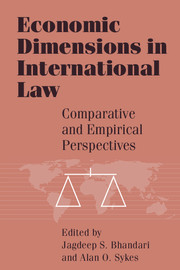Book contents
- Frontmatter
- Contents
- Preface
- Introduction: Economics and international law
- 1 The economics of the most favored nation clause
- 2 The economics of “injury” in antidumping and countervailing duty cases
- 3 The economics of “injury” in antidumping and countervailing duty cases: A reply to Professor Sykes
- 4 Innovations in support of the unitary injury test in U.S. unfair trade cases
- 5 The free trade–fair trade debate: Trade, labor, and the environment
- 6 International conflict and coordination in environmental policies
- 7 Market modernization of law: Economic development through decentralized law
- 8 Toward a positive theory of privatization: Lessons from Soviet-type economies
- 9 New stories on exchange rate policies in transition
- 10 Is deposit insurance inevitable? – lessons from Argentina
- 11 The market for migrants
- 12 The interplay of liquidation and reorganization in the bankruptcy systems of Canada and the United States: The role of screens, gatekeepers, and guillotines
- 13 International political economy approaches to international institutions
- 14 The trade effects of domestic antitrust enforcement
- 15 The Hartford Insurance Company case: Antitrust in the global economy – welfare effects and sovereignty
- 16 Recognition of foreign judgments as a trade law issue: The economics of private international law
- 17 Externalities and extraterritoriality: The law and economics of prescriptive jurisdiction
- Index
5 - The free trade–fair trade debate: Trade, labor, and the environment
Published online by Cambridge University Press: 05 December 2011
- Frontmatter
- Contents
- Preface
- Introduction: Economics and international law
- 1 The economics of the most favored nation clause
- 2 The economics of “injury” in antidumping and countervailing duty cases
- 3 The economics of “injury” in antidumping and countervailing duty cases: A reply to Professor Sykes
- 4 Innovations in support of the unitary injury test in U.S. unfair trade cases
- 5 The free trade–fair trade debate: Trade, labor, and the environment
- 6 International conflict and coordination in environmental policies
- 7 Market modernization of law: Economic development through decentralized law
- 8 Toward a positive theory of privatization: Lessons from Soviet-type economies
- 9 New stories on exchange rate policies in transition
- 10 Is deposit insurance inevitable? – lessons from Argentina
- 11 The market for migrants
- 12 The interplay of liquidation and reorganization in the bankruptcy systems of Canada and the United States: The role of screens, gatekeepers, and guillotines
- 13 International political economy approaches to international institutions
- 14 The trade effects of domestic antitrust enforcement
- 15 The Hartford Insurance Company case: Antitrust in the global economy – welfare effects and sovereignty
- 16 Recognition of foreign judgments as a trade law issue: The economics of private international law
- 17 Externalities and extraterritoriality: The law and economics of prescriptive jurisdiction
- Index
Summary
Introduction
Many trade scholars – both lawyers and economists – view the increasing preoccupation with “fair trade” as the most fundamental intellectual challenge or threat to the liberal trading order that has arisen in recent decades. This refers to the proliferation of arguments that free trade is only “fair” where one's trading partners adopt certain kinds of domestic policies and/or refrain from others (whether the policy area be competition law, intellectual property rights, regulation of services, environment, or labor standards), although concerns that the practices of one's foreign competitors are unfairly rigging the marketplace have a long genesis in international trade law, as reflected particularly in antidumping and countervailing duty laws.
The fair-trade claims that are currently generating the most debate in the trade community are those related to environmental and labor standards. The Economist magazine recently noted that “labor standards and environmental issues are playing an increasing role in international trade disputes” and are likely to be the central area of conflict between developed and developing countries in the next decade.
Most free traders see recent demands that trade be linked to compliance with environmental and labor standards as motivated by the desire to protect jobs at home against increased competition from the Third World and view many fair traders as charlatans (protectionists masquerading as ethicists).
- Type
- Chapter
- Information
- Economic Dimensions in International LawComparative and Empirical Perspectives, pp. 186 - 247Publisher: Cambridge University PressPrint publication year: 1998
- 2
- Cited by



